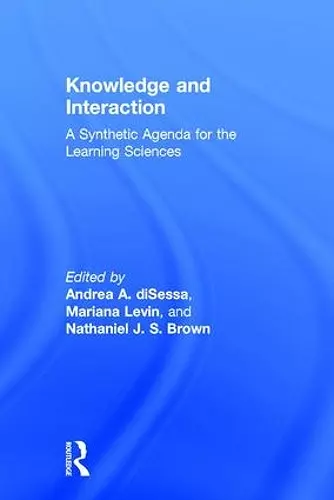Knowledge and Interaction
A Synthetic Agenda for the Learning Sciences
Andrea A diSessa editor Mariana Levin editor Nathaniel JS Brown editor
Format:Hardback
Publisher:Taylor & Francis Ltd
Published:7th Dec '15
Currently unavailable, and unfortunately no date known when it will be back
This hardback is available in another edition too:
- Paperback£58.99(9781138998292)

Decades of research in the cognitive and learning sciences have led to a growing recognition of the incredibly multi-faceted nature of human knowing and learning. Up to now, this multifaceted nature has been visible mostly in distinct and often competing communities of researchers. From a purely scientific perspective, "siloed" science—where different traditions refuse to speak with one another, or merely ignore one another—is unacceptable. This ambitious volume attempts to kick-start a serious, new line of work that merges, or properly articulates, different traditions with their divergent historical, theoretical, and methodological commitments that, nonetheless, both focus on the highly detailed analysis of processes of knowing and learning as they unfold in interactional contexts in real time.
Knowledge and Interaction puts two traditions in dialogue with one another: Knowledge Analysis (KA), which draws on intellectual roots in developmental psychology and cognitive modeling and focuses on the nature and form of individual knowledge systems, and Interaction Analysis (IA), which has been prominent in approaches that seek to understand and explain learning as a sequence of real-time moves by individuals as they interact with interlocutors, learning environments, and the world around them. The volume’s four-part organization opens up space for both substantive contributions on areas of conceptual and empirical work as well as opportunities for reflection, integration, and coordination.
"This volume brings together Knowledge Analysis and Interaction Analysis, two traditions that are important to the past, present, and future of the learning sciences. While some argue that these traditions are on opposite sides of the cognitive-situative divide, they are brought together here in ways that seek common ground and move the field forward rather than focusing on the differences. The dialogue created here will make this book a new classic for the learning sciences."
--Cindy Hmelo-Silver, Barbara B. Jacobs Chair in Education and Technology, Professor of Learning Sciences, and Director of the Center for Research on Learning and Technology at Indiana University, USA
"This timely volume offers a refined, subtle, and deeply engaged conversation among leading scholars who represent two important perspectives on how people learn: the dynamics of how knowledge grows and how social, embodied, situated learners interact to grow it. From mutual accountability to overlapping perspectives, the contributors provide the foundation for a next generation of detailed studies of how human competence evolves."
--Jeremy Roschelle, Director, Center for Technology in Learning, SRI Education, USA
"This book builds a productive dialogue among a group of prominent researchers from two traditions, Knowledge Analysis and Interaction Analysis. Each tradition seeks, in different ways, to understand and explain learning, and the authors enrich the research with ample documentation to provoke reflection on the complexities of the two traditions. By documenting their own struggles, this volume will help to foster mutual understanding and respect between sometimes hostile research traditions, and point to some tantalising new insights into research questions and methodologies."
--Professor Dame Celia Hoyles DBE, Professor of Mathematics Education, London Knowledge Lab, University College London, UK
ISBN: 9781138797130
Dimensions: unknown
Weight: 929g
614 pages